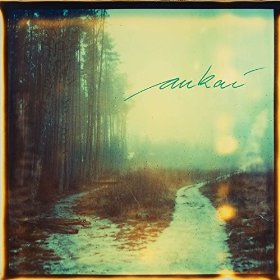Aukai in Echoes Podcast
Podcast: Play in new window | Download
Subscribe: RSS
You may have run across Markus Sieber if you follow the Kirtan and chant music scene. He performs in a duo called Mirabai Ceiba. Now he’s branched out from that group with a project called Aukai. It was the Echoes CD of the Month in June. Aukai operates in an area of pristine sound, rustic roots, and soulful melodies. You might think of Ludovico Eniaudi, The Penguin Café Orchestra or Gustavo Santaolalla. Aukai is a Hawaiian word for “traveler” and getting away was on the mind of the young Markus Sieber when he was growing up on the East German side of the Berlin Wall.
“So when I was a child locked up in East Germany, I was always dreaming of becoming a sailor and getting out of the country, because we could only travel like say 800 kilometers in the country,” Markus recalls with surprising fondness. “A friend had become a sailor and he was suddenly sending these postcards from Africa and I was like sure, I wanted to be a sailor, and I actually did my first application for an education as a sailor, but luckily, the wall came down then. I didn’t have to do that.”
Instead, Sieber became a musician who has traveled around the world, most of that time with his wife, pianist and singer Angelika Baumbach. They sing chants and spiritual music in their duo, Mirabai Ceiba. Their music is a long way from the sounds he played in punk bands growing up. “In the time, I was playing rock music,” reveals Markus “I was playing to Fugazi, to Dinosaur Jr., and Sonic Youth, this kind of music,” Markus recalls.
From punk bands came theater and acting. Markus Sieber is Hollywood handsome who could’ve fit in films like Eat, Pray, Love, although most of his films are much more obscure than that. But then came love and with it, a different kind of music when he met Mexican singer Angelika Baumbach in Edinburgh, Scotland.
“I started doing yoga and meditations, and we were connected to this yoga community through Angelika,” Markus explains. ” She was basically born in this community. Her mother was big time into yoga and it was in the ‘70s. It was a new way of getting rid of the old structures, from being a hippie to being a yogi. And so there was this full potential of writing music to mantra and to yoga, and so we were just doing it.”
That sound is quite a bit different from the music Markus makes with Aukai, but he says it’s still connected. “The core even now for Aukai has a meditative aspect to it,” divulges Markus. “Music and silence, music and space I think is something I’m very much interested in,” .
Aukai’s debut is an album of vaguely surreal, pastoral all-instrumental tone poems. Much of the sound is built around the ronroco, a smaller sibling to the South American lute called the charango. It’s a signature instrument of film composer Gustavo Santaolalla.
“I heard the ronroco for the first time when Gustavo Santaolalla was playing it in in one of his movie soundtracks,” Maruks remembers. “I think it was to Motorcycle Diaries. And I was just so fascinated by the sound that I was investigating what it was. I knew the sound of a charango before, but the ronroco has so much more depth to it and it’s still the same pristine clarity.”
The ronroco is featured on about half the tracks of Aukai’s debut album. Markus would take it with him on his travels, pulling it out and recording melodies when the mood struck him.
“Many of the pieces were written on the ronroco because you can carry the ronroco,” elaborates Markus. “It’s such a small instrument, for any kind of little hike. You just sit down somewhere on a waterfall in Brazil, play a little bit around and then little pieces came up. I scratched [recorded] the whole time little tracks on the iPhone, constantly. When I have time at home, I go through all those tracks and, and most of it is not interesting, but there are some little gems, then I start working on it.”
The ronroco isn’t the focus of the album. Instead, it’s a texture in a sound that’s rustic and modern, a folk chamber music with roots in acoustic instruments, but atmospheres steeped in ambience. “I would not allow myself to overdub everything I hear,’ he says, “but leave space for the listener to overdub in his mind what the listener would hear.”
Despite the gentleness of the music and the sweetness of his melodies, there is a darker undercurrent to the music of Aukai. To me, a song like “Feathers” seemed like a tense, horror story soundtrack with some Bernard Hermann-style violin and swirling keyboards. But Markus says it’s a lullaby.
“I don’t hear the dark actually,” Markus clarifies. “I think it’s a very tender piece. There’s this realm between day and dream. It’s a realm where also the dark side can come up, and it’s set in contrast with this very tender longing, dreamy tones, ronroco and violin soundscapes. And I just feel it all belongs together. It’s definitely a very tender piece.”
The mood that does pervade the debut by Aukai is one of nostalgia. The music isn’t old, but it conjures up a wistful yearning and sense of a more genteel time.
“When I listened for the first time to the full album sequence, I felt like, wow, I want to dedicate it to my parents,” he exclaims. “It has so much to do with my childhood. Every piece kind of has this approach of both looking back and being such a force in the moment.”
The music of Markus Sieber’s Aukai may be nostalgic, but it’s a nostalgia touched by a modern hand. Markus Sieber’s Aukai is out on Aukai Music.


